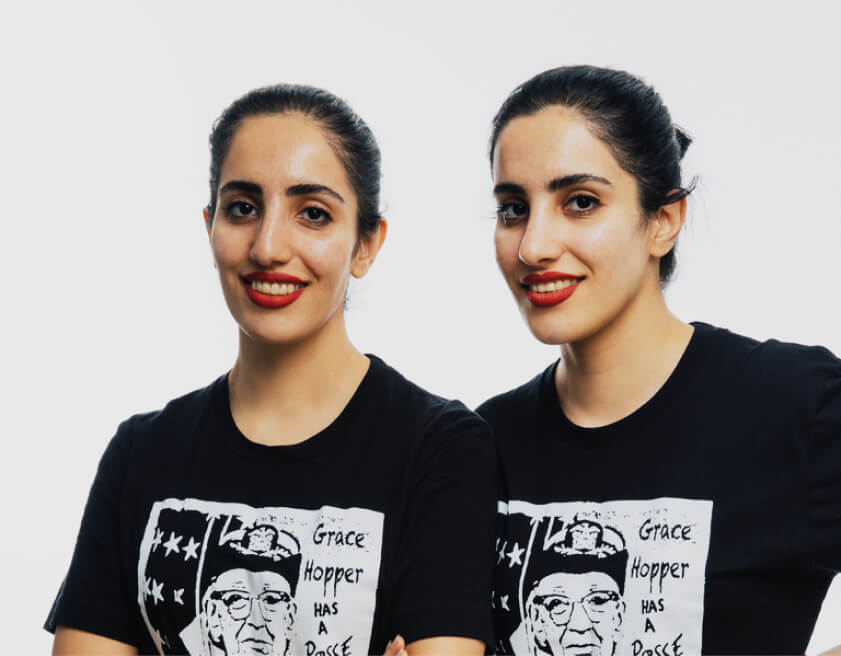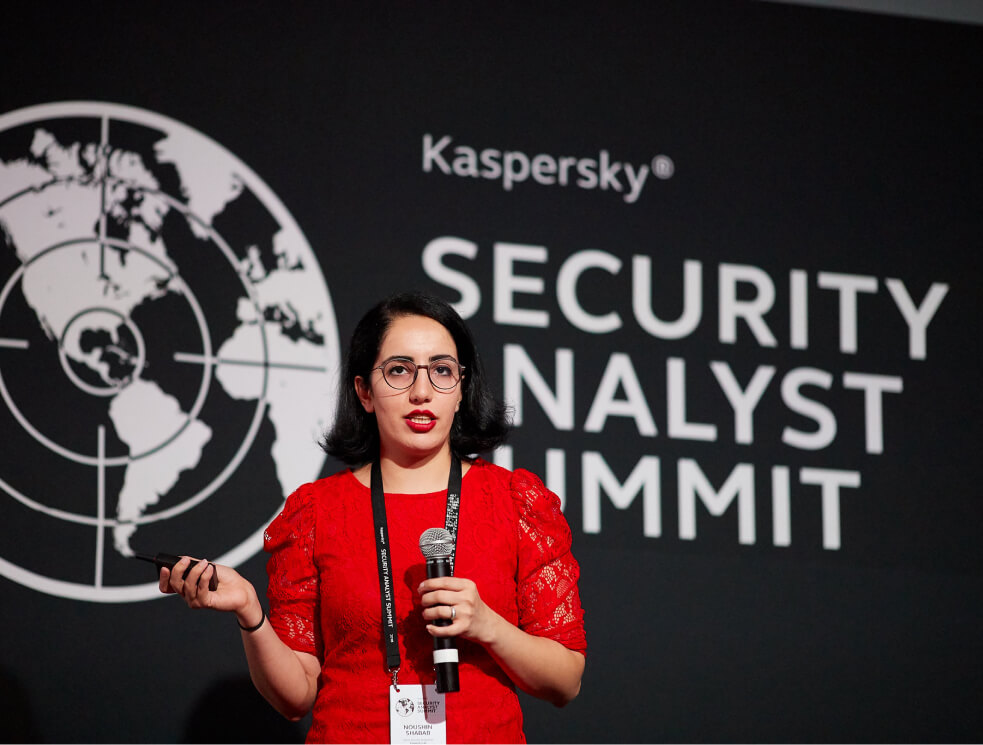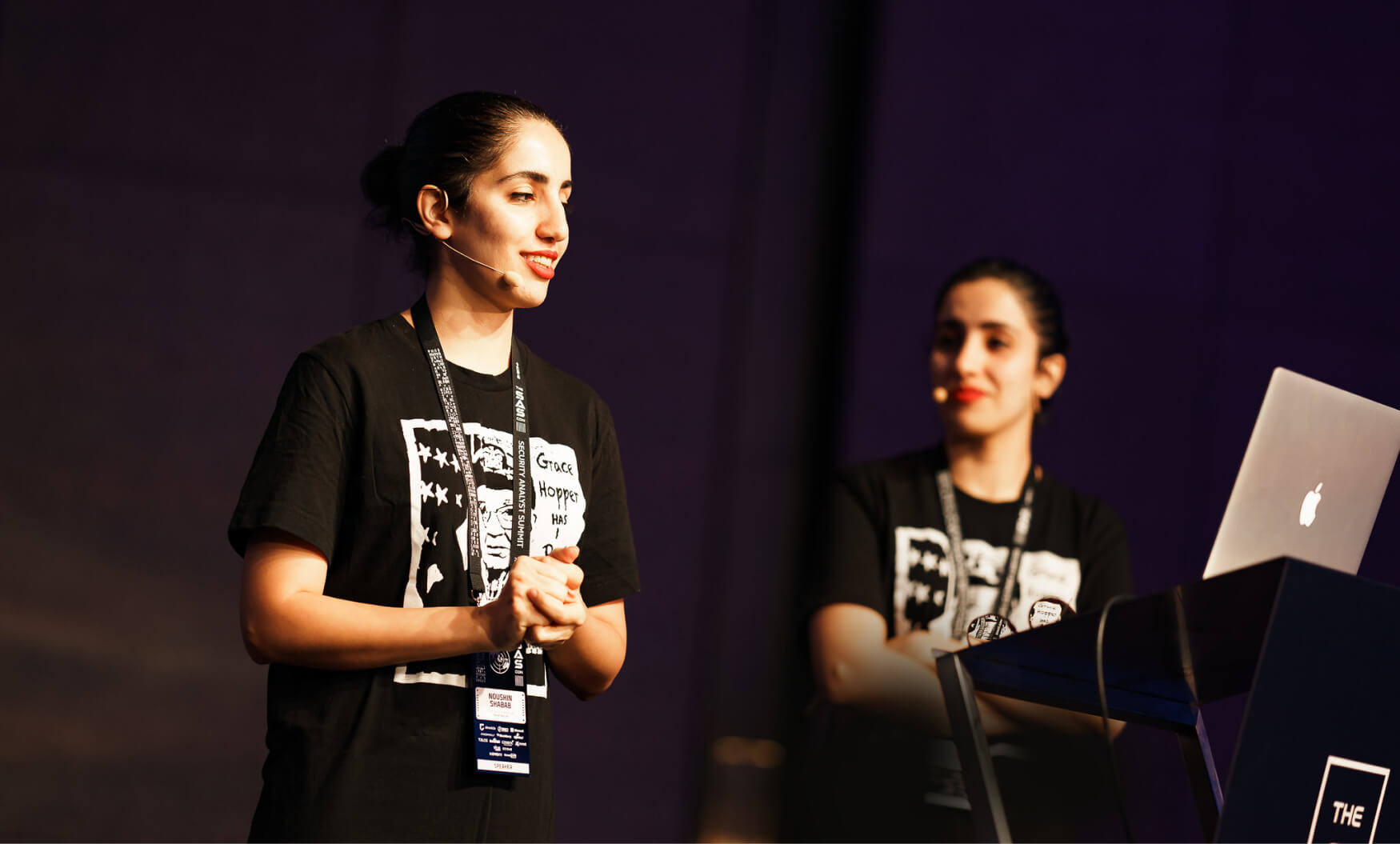‘My work is never going to be a routine job’

She lives in Australia and is a member of the Global Research & Analysis Team (GReAT), an elite group of more than 40 security experts. The team is well-known for the discovery and dissection of some of the world’s most sophisticated threats, including cyber-espionage and cyber-sabotage threats.
 As a child, I was a doer, not a dreamer.
As a child, I was a doer, not a dreamer. 
We spoke to Noushin about her career path, the challenges she has encountered, and how she contributes to greater diversity in the industry by encouraging women to work in IT.
In terms of gender parity, the APAC region, where Noushin lives and works, has plenty of room for growth.
49% of women believe that men enjoy faster career growth in IT companies than their female peers. Meanwhile, 50% admit that the gender imbalance in IT gave them cause for doubt before pursuing a career in the industry.
I was always keen on learning and trying new things. Luckily, my parents were teachers and supported the passion my twin sister and I had for learning, and our interest in computer science and mathematics. When we were growing up, we used to invent mathematical problems and puzzles for each other. Eventually, my sister opted for a career in IT as well, and works as a researcher at Microsoft. We’re incredibly grateful to our parents for their support.
I developed an interest in IT and programming back in middle school. Soon after, I began participating in national programming contests and computer science competitions. At the time, I already knew I wanted to study IT or related areas in college. My sister was always my biggest supporter, and we were together almost all of the time — at school, in college, and even at our first job.

Interestingly, my sister and I have always done everything at the same time. We took the same courses and solved the same sets of problems. In middle school, we got interested in computer science and would solve advanced-level puzzles that high school students put on a board for younger students to solve. We even tried our hand at assembling robots! Trying to make a robot wasn’t very common at the time.
We are well aware that cybercriminals can target any object, from a smart
home to an autonomous car. Our most powerful weapon in countering them is our curiosity. On another important note, we shouldn’t stick to what we’re
good at and settle for it.
When my sister and I started a university course in Iran, we got jobs at a company that engaged in cybersecurity and developed antivirus software and other security products. My sister was a bit more interested than me in programming, so I tried to support her find projects that put her talent to good use. In turn, she also supported me in my tasks. Around the same time, we moved out of our parents’ house, so we were together all the time and even spent weekends working from home.

Interestingly, as we delved deeper into cybersecurity, we started pushing each other to suggest new business development areas to our colleagues, and even specific projects that we considered launching. Fortunately, we were working at a startup company, and they were extremely open to all things new.
My time at university was just as action-packed. Our professors suggested that I could help other students with some of the disciplines I was good at. This turned out to be quite engaging and rewarding.
Looking back, I realize that these disciplines are the things that have benefitted me most in my present job. Computer science is very broad. There were many aspects, and we learned a little bit of each. Eventually, I decided to focus on cybersecurity. I enjoy dealing with something new in my work every day and handling very diverse problems quickly.
In diverse teams, people are more open-minded
Kaspersky turned out to be a multinational and multicultural team that I greatly enjoy being a part of. I have never faced any issues in this regard and consider diversity a great advantage for an employer. Our team brings together people from various backgrounds, life experiences and opinions. In diverse teams, people are more open-minded, which contributes to a welcoming and comfortable working environment.

APAC is one of the most promising regions for women seeking a career in IT. A total of 76% of female respondents in APAC believe their skills and experience were considered to be more important than their gender during the interview process for an IT or tech role.
I like the fact that my work is never going to be a routine job
Cybercriminals have to change their techniques and tools all the time, which gives me the challenge of facing new problems every day. While it feels nice when you know how to solve a problem, it also feels nice to have new challenges and to test your skills as well. I like the balance. And I also like the fact that my work is never going to be a routine job.
Our industry is the most rapidly developing technology-wise. Cyberattacks happen in every sphere of our life. To update our skillset and to be able to fix some of these problems, you need to dedicate some time to exploring new things and applying it to your work as you go.
We are well aware that cybercriminals can target any object, from a smart home to an autonomous car. Our most powerful weapon in countering them is our curiosity. On another important note, we shouldn’t stick to what we’re good at and settle for it.
My greatest source of inspiration is the value we bring others by helping them. I enjoy changing people’s lives for the better by mitigating the stress and harm induced by cybercriminals. And then helping to bring things back to normal.
It’s important to support other women working in cybersecurity
When I accepted the job at Kaspersky, I knew I was joining a global team and of course there were women working in various roles at the company. However, to my surprise, at that time I was the only female threat researcher in the GReAT team. Of course I understood that in general there’s a gender gap in our industry but at that moment I realized how big it was. Over time, more women have joined our team, which makes me feel very happy.
Being a part of a male-dominated industry can sometimes bring challenges for women. One way to help overcome these challenges is to build your confidence. It’s important that our industry supports newcomers regardless of their gender to help boost that confidence. While gender parity in IT is still nowhere in sight, we all need to understand that both men and women have the same brains in the biological sense, and are equally capable of intellectual work.
This is why I enjoy seeing more and more women entering and working in cybersecurity, a traditionally male-dominated industry. Meanwhile, I do what I can to support Australian non-profits that encourage female high school and college students, as well as graduates, to explore cybersecurity technologies and boost their relevant skills to consider a career in this field.

62% of APAC-based respondents have witnessed a growth in the number of women at their IT companies over the last two years, with 56% of respondents worldwide confirming this observation.
I ’ve done some mentoring work over the past few years, offering workshops in my field of expertise to college students. I remember delivering my first workshop following an invitation from the Australian Women in Security Network (AWSN), a non-profit that aims to connect, support, collaborate and inspire women in the Australian cybersecurity industry. The workshop was an awesome experience.
I was delighted to see all of my female students, among others, at a conference after my workshop; while a year before, there were only three or four women, including myself, at the same conference. It was rewarding for me to see them sitting in the first row, taking notes at my presentation. It was incredibly satisfying to realize they were seriously considering a career in infosec.

We should introduce girls to IT opportunities in schools
I’m convinced, however, that we should introduce girls to opportunities in IT much earlier. It would be great to see some confidence-building programs for schoolgirls interested in tech. In my opinion, it’s essential to talk about gender stereotypes early on and encourage girls to take an interest in technology and IT. The first step in a new direction is always the hardest. Without a supportive environment, girls can struggle to find kindred spirits in online communities or at relevant offline events. They need to see that IT professionals are ordinary people with diverse skillsets and abilities, and that anyone can aspire to join the tech space.
Admittedly, a perfectly balanced IT community and the world as a whole remains a long-term goal. However, the changes I’m witnessing inspire admiration and immense optimism. The external pressure remains intense, of course, but a strong community can withstand it. Being aware of your desires, rights, and skills is a powerful source of positive change.





